- Home
- Keith R. A. DeCandido
The Zoo Job Page 5
The Zoo Job Read online
Page 5
Sophie asked, “So why is the board pushing to report it?”
“That is an excellent question. Some of its members have to be dirty. Hardison, what’d you find out?”
Everyone turned to give Hardison an expectant look. This was when he generally provided a list of often very entertaining secrets, lies, cover-ups, and other gossip.
As a result, everyone was brought up short when he just shrugged and said, “Nothing.”
“Excuse me?” Nate asked, stunned.
“Nothing. Nada. Zip. Zilch. Ziparoonio. These guys are animal lovers, Nate. They’re all regular people—”
“Rich regular people,” Nate added testily.
But Hardison shook his head. “These folks are house-in-the-suburbs rich, not mansion-on-the-hill rich. And they’re the kinda people who like animals and buy stock in zoos, so . . .”
For the first time Parker spoke. “That doesn’t mean anything. Hitler was an animal lover.”
Hardison shot her a look. “Yeah, but I don’t think he went around killing people and being the evilest person in history because he was an animal lover. I think he was doing that ’cause he was Adolf Hitler.”
“Actually,” Sophie said, “Hitler was an excellent grifter, if you think about it. Postwar Germany was devastated, they’d been beaten in the war and then strangled by reparations to the rest of Europe. They were the easiest of marks, and he sold them all on falsehoods, playing on their fears for his own gain. It’s the same thing every grifter does.”
“Except for the part about being evil,” Parker added.
“Right.”
Eliot was staring at Sophie with the incredulous expression he usually reserved for Parker. “Are you seriously comparing Hitler to—well, us?”
“Of course not!” Sophie said, appalled at the very notion. “I mean, structurally, it’s a similar thing, but structurally, we’re similar to plenty of people. And we used to be—”
“Not Hitler!” Hardison was shaking his head. “Woman, you are not—”
Nate held up both hands. “Can we get back on track, please?”
“Fine by me.” Eliot was still staring daggers at Sophie.
“There’s another reason why Marney won’t contact IYS. They have investigators. Now, their three best aren’t there anymore.”
Sophie gave him a playful smile. “If you do say so yourself.”
Pointedly ignoring the dig, Nate said, “I quit, Sterling went to Interpol, and Owen Wallace got fired and is in an Oregon prison.”
Sophie nodded, remembering Wallace as a good man who let his obsession over a missing Vincent van Gogh painting get the better of him. He was arrested after he fired a handgun in the middle of a roller-skating rink.
“Unfortunately,” Nate continued, “since we forced Blackpoole out, IYS has been on an austerity kick—which means a hiring freeze. They didn’t replace Sterling when he quit, they didn’t replace Owen when he got fired, and they didn’t replace two others who retired. So now they have eight people doing the work of twelve.”
“And none of them as good as Sterling or Owen,” Parker said.
Nate regarded Parker with annoyance.
“Or you,” Parker added quickly. “I was going to say you. Really!”
With the ease of long practice, Sophie was able to keep herself from grinning, but it was a near thing.
Sighing, Nate turned back to the screen. “In any event, even without having any of their best people left, IYS might still find out that there were some—well, irregularities.”
“What kind of irregularities?” Eliot asked.
Hardison clicked the remote, bringing forward the map of Africa, the dilapidated building, the priest, the man in uniform, and the picture of the Black Star.
Nate looked at Eliot. “She brokered the deal to get the black rhinos from Malani.”
Eliot winced. Sophie knew that look on his face: Eliot had been to Malani before joining Nate’s crew, and during that period in his life, he usually only visited countries in order to do unpleasant things in them.
“Lemme guess,” Hardison said. “You were there when General Polonia took over?”
“No—before that.” Eliot stared right at Nate. “I was there when Damien Moreau needed to run arms through Malani.”
NINE YEARS AGO
As he got out of the rental car, Eliot Spencer looked very carefully at the two men pacing back and forth in front of Aloysius Mbenga’s mansion in Pequeño Lago. They wore the uniforms of the Malani Royal Army, in service to King Lionel.
The driver had just brought him and Damien Moreau to this edifice in Malani City’s only real suburb. As he got out of the other side of the car, Moreau nodded at the driver, who kept the motor running, grabbed a copy of the International Herald Tribune, and started flipping through it.
Eliot lowered his head and ran a hand through his close-cropped air as he whispered to Moreau. “Those guys may be dressed like MRA, but they’re trained by SF.”
Without looking at Eliot, Moreau said, “You can tell they’re U.S. Army Special Forces just by the way they pace?”
“It’s a very distinctive pace.”
Moreau nodded.
As they walked toward the entrance, one of the army guys stopped pacing and opened the huge wooden door. Eliot could see an earpiece, through which he had probably been informed by the gate guard that they were coming. The man said nothing, simply holding the door for them, then leading them through a lavish foyer into a living room with a leather couch, a matching easy chair, an end table on which sat an expensive marble sculpture, what looked like a Rembrandt on the wall over a massive fireplace, which was currently inactive, and several stone figurines on a mantelpiece.
A sideboard was behind the leather couch, and standing in front of it was Aloysius Mbenga, one of the richest men in Malani. He was pouring an amber liquid from a crystal decanter into a crystal glass. Mbenga’s suit probably cost as much as the Rembrandt, and he wore a diamond-encrusted ring on his left pinkie. A diamond pin sat in his suit jacket’s buttonhole as well. Given that he’d made his fortune off diamond mining, this wasn’t very surprising.
The soldier remained standing at parade rest to the left of the doorway. As Moreau moved to stand facing Mbenga, Eliot placed himself in a position between his employer and the soldier, close to the door.
“So, Mr. Moreau,” Mbenga said, “I understand that you wish to sell arms in my country, and that you wish to use my men, my warehouses, and my shipping company.”
“‘Use’ is such a strong word.”
“Hire, then?”
“Oh, no, it’s very much the right word. Simply a strong one.”
“And why would I agree to this?”
Moreau had stared at the sideboard several times, but was not offered a drink. He then started to walk around Mbenga. “If you agree to my terms, you will receive fifteen percent of all monies I make. The arms business is quite lucrative, and is about to get more so. You will do well.”
“I do not require any more money, Mr. Moreau.”
That prompted one of Moreau’s smiles that made him look like a cat about to chow down on a mouse. “Yes, but if you do not agree to allow me to—to hire your services, I will be forced to show your wife the video footage of your many and varied trysts.” He walked up to the sideboard and grabbed the decanter.
Eliot saw the soldier tense, but Mbenga held up a hand and he relaxed.
As he poured, Moreau said, “You really shouldn’t use a wireless video camera to record your exploits.”
“Do you wish to know why I record those ‘exploits,’ Mr. Moreau?” Mbenga broke into a huge grin, showing off a perfect set of white teeth. “So my wife may watch them. It is what she enjoys. I’m afraid that if you’re going to blackmail me, you’re going to
have to work a bit harder.”
Eliot had tremendous self-control. He needed it in his line of work, because losing control meant people died—people who weren’t supposed to die, anyhow. So it was very easy for him not to burst out laughing at Damien Moreau being outmaneuvered by a couple who turned out to be kinkier than he had apparently expected.
Mbenga snatched the drink out of Moreau’s hand before he could take a sip and placed it back on the sideboard. “You don’t have time to drink. You are leaving.”
Moreau then glanced over at Eliot. “Spencer,” was all he said.
Eliot whipped his fist out with an uraken strike to the soldier’s solar plexus. As the soldier struggled for breath and reached for his weapon, Eliot did a quick right sweep, his ankle colliding with the soldier’s Achilles’ heel. He fell to the ground, and Eliot kicked him in the left temple.
“Your man there was trained by Special Forces. My man there took him down in three and a half seconds.”
Eliot had counted it as three and a quarter, but he was willing to forgive Moreau for rounding off.
Moreau then leaned in to stage-whisper in Mbenga’s ear. “If you refuse my offer, the next time your wife decides to enjoy one of your shows, Spencer will do something similar to her. And she does not have Special Forces training.”
NOW
“Then what happened?”
Nate noticed that Parker had been sitting on the edge of her seat during Eliot’s quick summary of his time in Malani in Damien Moreau’s employ.
Eliot took a quick bite of his sandwich before replying to Parker’s question. “Mbenga called Moreau’s bluff. He had another tryst, we traced the wireless signal to the location where the wife was watching. I went in, put a finger to her temple, and said ‘blam.’ Mbenga was in Moreau’s pocket after that.”
“Will that help us now?” Sophie asked. “I mean, the man obviously isn’t in Moreau’s pocket anymore.”
Nate allowed himself a small smile of pride at that. Moreau—a money launderer, arms dealer, and one of the most notorious criminals in the world—was rotting in a prison cell in San Lorenzo, a country he’d all but owned until Nate showed up. Anyone previously in his pocket was now free to run loose.
“No, he’s moved pockets—to General Polonia’s.”
Shaking his head, Hardison said, “That ain’t good.” He hit the remote, highlighting Malani in purple on the African map on the screen. The tiny nation was a strip of land wedged between Angola and Namibia on the western coast, just north of South Africa. The man in the military uniform also moved to the foreground. “The region was ruled by one of the Bantu kingdoms until the 1500s, when the Portuguese showed up and colonized the whole area. In 1974, there was a coup in Portugal, and a bunch of their colonies declared independence—Angola, Mozambique, East Timor, Malani. King Lionel was crowned as the new Bantu king in 1975, and he lasted until 2003, when there was another coup, this time on him.”
“Led,” Eliot added, “by troops armed with weapons supplied by Damien Moreau.”
“Why am I not surprised?” Sophie muttered.
“There were free elections, they put a president into power, she lasted all of two months before the military took over.” Hardison pointed at the general. “General Olorun Polonia’s in charge now, and he’s been keeping his iron fist pretty well polished ever since.”
“And Aloysius Mbenga’s his minister of finance,” Eliot added.
Sophie was staring at the image of the general. “Is Olorun really his given name?”
Hardison blinked. “Uh—I guess so. Not sure, really. Why?”
“Olorun is the divine creator of all things in Yoruba mythology,” Sophie said, “ruler of all the heavens. Either his parents thought very highly of him—or he took the name on purpose.”
Eliot swallowed the last of his sandwich. “Either way, he’s a bastard.”
Parker asked, “Is he the one they bought the hippos from?”
“Rhinos,” Hardison said, “black rhinos, and no. Ms. Brillinger did the deal with a priest named Michael Maimona.” He brought the reverend’s face to the fore. “He’s not exactly legit, insofar as he’s got his fingers in all kinds a’ pies, but it all seems to be to finance his hospital.” Another click, and the battered old building moved to the center. “This place isn’t just a medical clinic; it’s an orphanage and a homeless shelter. The clinic’s supply list doesn’t match their official purchases list, so they’re probably gettin’ stuff off the black market.”
“He ain’t gettin’ it from the government,” Eliot said. “Polonia figures the sick should just die and be done with it. Malani’s got an overpopulation problem anyhow. People flee across the border to Namibia all the time.”
Hardison clicked the Black Star forward. “Now, according to Ms. Brillinger, the Reverend Maimona put the black rhinos on the Black Star, and then another ship called the Black Star pulled into Boston last week.” He shook his head. “I checked into it, but the shipping records are a mess. There’s, like, a hundred Black Stars, and half of them are called something else now.”
Nate frowned. “Don’t ships have transponders that allow you to track them?”
“Yeah, and if I knew which of the hundreds of thousands of transponders floating around the Atlantic Ocean belonged to either of the Black Stars we’re talkin’ about, I’d be able to track ’em, but otherwise? It’s like findin’ a needle in a big pile of other needles.”
Parker stared quizzically at Hardison. “Not like a needle in a haystack?”
“Needle in a haystack’s easy—just bring a magnet.”
Eliot stared witheringly at Hardison. “You take the poetry out of everything.”
“Says the man who’d just punch the haystack.”
Nate let the others engage in their usual banter while he thought through the best plan of attack. After that, he thought of seven or eight more plans of attack. Then he went with Plan D.
He walked over to the screen and cut off whatever pointless argument Hardison, Eliot, and Parker were indulging in. “All right. Sophie, you and Eliot are going to Malani.”
Eliot stood up. “Nate, my contacts there are eight or nine years old, and mostly don’t like me much.”
“We need to find out what happened to the rhinos on that end, and whether the culprit is Reverend Maimona or the owners of the Black Star or some other third party. Worst case, there’s a man over there living in a snake pit trying to keep kids from dying. If he’s being screwed, I’d like to fix that.”
To Nate’s relief, but not to his surprise, Eliot said nothing in response.
“Meanwhile, Parker, Hardison, and I will look more closely into the Brillinger Zoo’s board of directors. Animal lovers or not, something’s not right there.”
He looked around at the others. Sophie had that faraway look she got when she was trying to figure out the best approach to her mark. Parker was fiddling with her fingernails. Eliot was like a coiled spring; now that they had a job, a plan, and a direction, he was ready to go into action. As for Hardison, he looked frustrated because, as usual, the rest of the team hadn’t done a sufficient job of appreciating what he did.
What Hardison never understood was that Nate didn’t care how everyone did what they did. He was no more concerned with the specifics of Hardison’s computer work than he was with the details of Eliot’s punches and kicks, or which lock picks Parker used, or the methodology Sophie used to create her characters—though that part he actually did understand, as he used many of the same techniques himself.
Nate nurtured the hope that Hardison would someday comprehend that lack of need for the leader to know the details.
After letting out a quick breath, and realizing that he desperately needed an Irish whiskey, Nate looked at his crew. “Let’s go steal back some rhinos.”
FOUR
The Reverend Michael Maimona looked out over the dozen or so sweaty people gathered in the chapel.
The word chapel was perhaps stretching it a bit. It was the only room in the clinic that could fit more than six people. The word also only really applied on Sunday mornings. On weekdays, the space served as a classroom, and every evening it was a dining hall. Dinner was the only meal the reverend could serve here. People generally provided their own breakfast, and lunch was a luxury they couldn’t afford.
The ceiling fan overhead labored, moving the humid, stale air around. Reaching into the pocket of his linen slacks, Michael pulled out a stained handkerchief and dabbed his bald pate.
After a quick glance down at the Bible, he read aloud to his flock. “‘And a leper came to him, beseeching him, and kneeling said to him, “If you will, you can make me clean.” Moved with pity, he stretched out his hand and touched him, and said to him, “I will. Be clean.” And immediately, the leprosy left him, and he was made clean. And he sternly charged him, and sent him away at once, and said to him, “See that you say nothing to anyone, but go, show yourself to the priest, and offer for your cleansing what Moses commanded, for a proof to the people.” But he went out and began to talk freely about it, and to spread the news, so that Jesus could no longer openly enter a town, but was out in the country. And people came to him from every quarter.’” He looked around at the bored-looking faces. “You’d think Jesus would have known better, yes?”
That got a chuckle out of everyone.
“When word got around that Jesus could heal people, they wouldn’t leave him alone. Sickness, after all, is something to be avoided, yes? So everywhere he went, the sick came upon him. But for all that he admonished the leper not to spread the word, he did not turn the others away.”
A young boy in the third row coughed, then looked up apologetically at Michael. The reverend just nodded and continued.
“But if you continue reading the Gospel of Mark, you’ll see that Jesus continued to heal—but also continued to preach. Everywhere he went, he spread the gift of God by healing, but he also spread the word of God, healing the spirit as much as he was healing the body. Now, I would not presume to liken myself to the Lord or His son, but what we do here at the clinic is very much the same thing. Just as the people of Galilee came for the healing but stayed for the preaching, so I expect it of all of you.” He grinned. “One could say that listening to me is the price you have to pay.”

 Alien
Alien Miracle Workers
Miracle Workers Articles of the Federation
Articles of the Federation Supernatural Heart of the Dragon
Supernatural Heart of the Dragon War Stories: Book Two
War Stories: Book Two The Zoo Job
The Zoo Job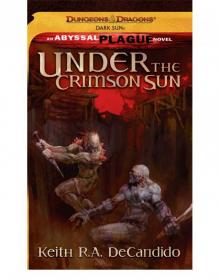 Under the Crimson Sun
Under the Crimson Sun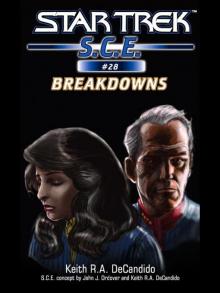 Breakdowns
Breakdowns Mermaid Precinct (ARC)
Mermaid Precinct (ARC) Supernatural 1 - Nevermore
Supernatural 1 - Nevermore STAR TREK - The Brave and the Bold Book One
STAR TREK - The Brave and the Bold Book One Four Walls
Four Walls The Klingon Art of War
The Klingon Art of War Blackout
Blackout War Stories: Book One
War Stories: Book One The Brave and the Bold Book Two
The Brave and the Bold Book Two Honor Bound
Honor Bound Sleepy Hollow: Children of the Revolution
Sleepy Hollow: Children of the Revolution Worlds of Star Trek Deep Space Nine® Volume Three
Worlds of Star Trek Deep Space Nine® Volume Three Star Trek: TNG: Enterprises of Great Pitch and Moment
Star Trek: TNG: Enterprises of Great Pitch and Moment Genesis
Genesis Demons of Air and Darkness
Demons of Air and Darkness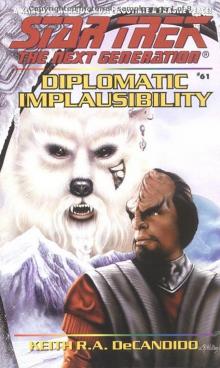 Star Trek - TNG - 61 - Diplomatic Implausibility
Star Trek - TNG - 61 - Diplomatic Implausibility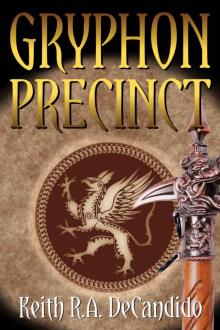 Gryphon Precinct (Dragon Precinct)
Gryphon Precinct (Dragon Precinct)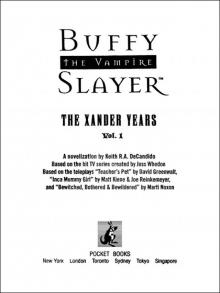 THE XANDER YEARS, Vol. 1
THE XANDER YEARS, Vol. 1 Nevermore
Nevermore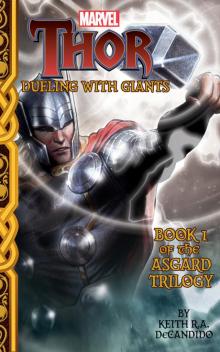 Thor
Thor The Brave And The Bold Book One
The Brave And The Bold Book One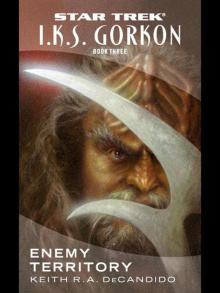 I.K.S. Gorkon Book Three
I.K.S. Gorkon Book Three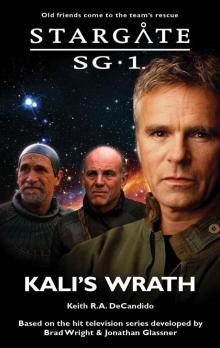 STARGATE SG-1: Kali's Wrath (SG1-28)
STARGATE SG-1: Kali's Wrath (SG1-28) Bone Key
Bone Key Guilt in Innocece
Guilt in Innocece Star Trek - DS9 Relaunch 04 - Gateways - 4 of 7 - Demons Of Air And Darkness
Star Trek - DS9 Relaunch 04 - Gateways - 4 of 7 - Demons Of Air And Darkness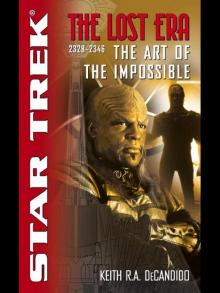 The Art of the Impossible
The Art of the Impossible I.K.S. Gorkon Book One: A Good Day to Die
I.K.S. Gorkon Book One: A Good Day to Die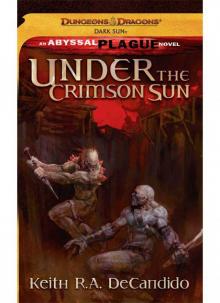 Under the Crimson Sun (the abyssal plague)
Under the Crimson Sun (the abyssal plague)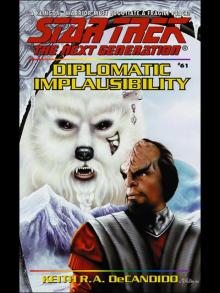 DIPLOMATIC IMPLAUSIBILITY
DIPLOMATIC IMPLAUSIBILITY Tales from the Captain's Table
Tales from the Captain's Table A Burning House
A Burning House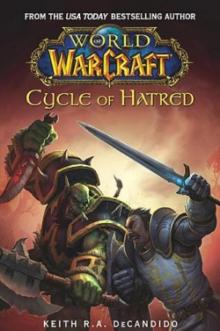 Cycle of Hatred (world of warcraft)
Cycle of Hatred (world of warcraft) Have Tech, Will Travel
Have Tech, Will Travel Security
Security